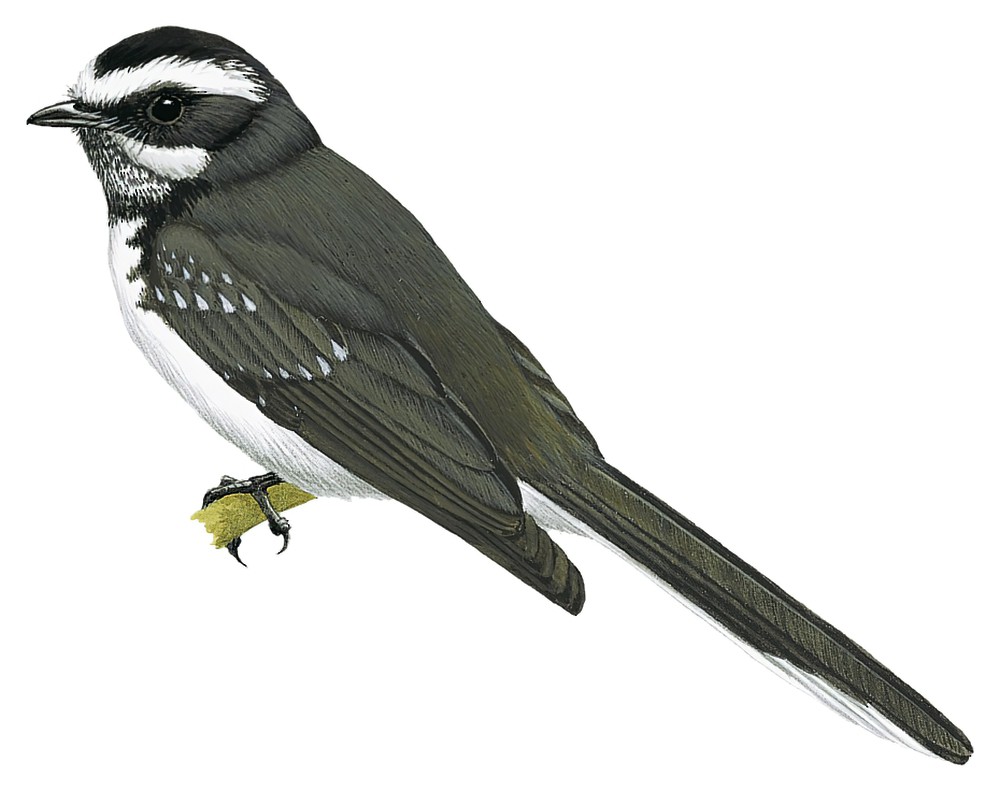White-browed Fantail / Rhipidura aureola

White-browed Fantail
SCI Name:
Protonym: Rhipidura aureola TraitedOrn. livr.5 p.390
Taxonomy: Passeriformes / Rhipiduridae / Rhipidura
Taxonomy Code: whbfan2
Type Locality: 'la Nouvelle Hollande'' = Bengal, fide Stuart Baker, 1924, Fauna Brit. India, Birds, 2, p. 277. 1
Author: Lesson
Publish Year: 1831
IUCN Status: Least Concern
DEFINITIONS
RHIPIDURA
(Rhipiduridae; Ϯ New Zealand Fantail R. fuliginosa) Gr. ῥιπις rhipis, ῥιπιδος rhipidos fan; ουρα oura tail; “Fan-tailed Fly-catcher ... flies always with its tail spread in shape of a fan.” (Latham 1783); "Genus. RHIPIDURA*. Rostrum breve, depressum, basi latum, apice compressum, culmine arcuato; mandibula superiore apice emarginata; naribus basalibus, ovalibus, setis plumulisque fere obtectis; rictu vibrissis confertis mandibulas longitudine fere superantibus instructo. Alæ mediocres, subacuminatæ; remige prima brevissima, secunda duplo longiore, tertia et quarta, quæ est longissima, gradatim longioribus. Cauda elongata, patula, apice rotundata. Pedes mediocres, graciles, acrotarsiis paratarsiisque integris. This group may be at once recognised as offering strong marks of distinction from the true Muscicapa in the fan-like structure of the tail. ... *'Pιπις flabellum, and ουρα cauda. ... 1. FLABELLIFERA. ... Muscicapa flabellifera. Gmel. i. 943. no. 67. Fan-tailed Flycatcher. Lath. Gen. Hist. vi. p. 184. no. 44. pl. 99. ... Fantail.—There is something singular in the habits of this bird. It frequents the small trees and bushes, from whence it suddenly darts at its prey, spreading out its tail like a fan, and to appearance turning over like a tumbler Pigeon, and then immediately returning to the same twig or bough from whence it sprang. ... 2. MOTACILLOIDES. ... It bears a great resemblance to the description of Dr. Latham's Motacilla atricapilla, or the Black-topped Flycatcher of his "General History," but differs in the colour of the bill, back and throat. ... 3. RUFIFRONS. ... Muscicapa rufifrons. Lath. Ind. Orn. Supp. p. 1. no. 5. Rufous-fronted Flycatcher. Id. Gen. Hist. vi. p. 213. no. 95." (Vigors & Horsfield 1827); "Rhipidura Vigors and Horsfield, 1827, Trans. Linn. Soc. London, 15, p. 246. Type, by subsequent designation (G. R. Gray, 1840, List Gen. Birds, p. 32), Muscicapa flabellifera Gmelin [= Muscicapa fuliginosa Sparrman]." (Mayr in Peters 1986, XI, 530).
Var. Ripidura, Rhipadura, Rhissidura.
Synon. Cyanonympha, Howeavis, Leucocirca, Muscylva, Neomyias, Rhipidicidura, Ripidicala, Rupicula, Sauloprocta, Setosura.
rhipidura / rhipidurus
Gr. ῥιπις rhipis, ῥιπιδος rhipidos fan; -ουρος -ouros -tailed < ουρα oura tail.
aureola
L. aureolus golden, brilliant < aurum gold (cf. Med. L. aureola golden crown).
● ex “Avicula surinamensis nigra, capite e luteo coccineo” of Petiver 1702-1709, “Avicula mexicana de Chichil totolh altera” of Seba 1734-1765, “Parus niger & fulvus” of Edwards 1747, and “Parus niger, capite pectoreque coccineis, remigibus antrorsum macula alba” of Linnaeus 1764 (Pipra).
SUBSPECIES
White-browed Fantail (aureola)
SCI Name: Rhipidura aureola aureola
aureola
L. aureolus golden, brilliant < aurum gold (cf. Med. L. aureola golden crown).
● ex “Avicula surinamensis nigra, capite e luteo coccineo” of Petiver 1702-1709, “Avicula mexicana de Chichil totolh altera” of Seba 1734-1765, “Parus niger & fulvus” of Edwards 1747, and “Parus niger, capite pectoreque coccineis, remigibus antrorsum macula alba” of Linnaeus 1764 (Pipra).
White-browed Fantail (compressirostris)
SCI Name: Rhipidura aureola compressirostris
compressirostris
L. compressus compressed < comprimere to compress; -rostris -billed < rostrum beak.
White-browed Fantail (burmanica)
SCI Name: Rhipidura aureola burmanica
burmae / burmana / burmanica / burmanicus / burmannica / burmannicus
Burma, named after the indigenous B’mar peoples (= Myanmar, a recently readopted older name for the country).
UPPERCASE: current genus
Uppercase first letter: generic synonym
● and ● See: generic homonyms
lowercase: species and subspecies
●: early names, variants, mispellings
‡: extinct
†: type species
Gr.: ancient Greek
L.: Latin
<: derived from
syn: synonym of
/: separates historical and modern geographic names
ex: based on
TL: type locality
OD: original diagnosis (genus) or original description (species)












